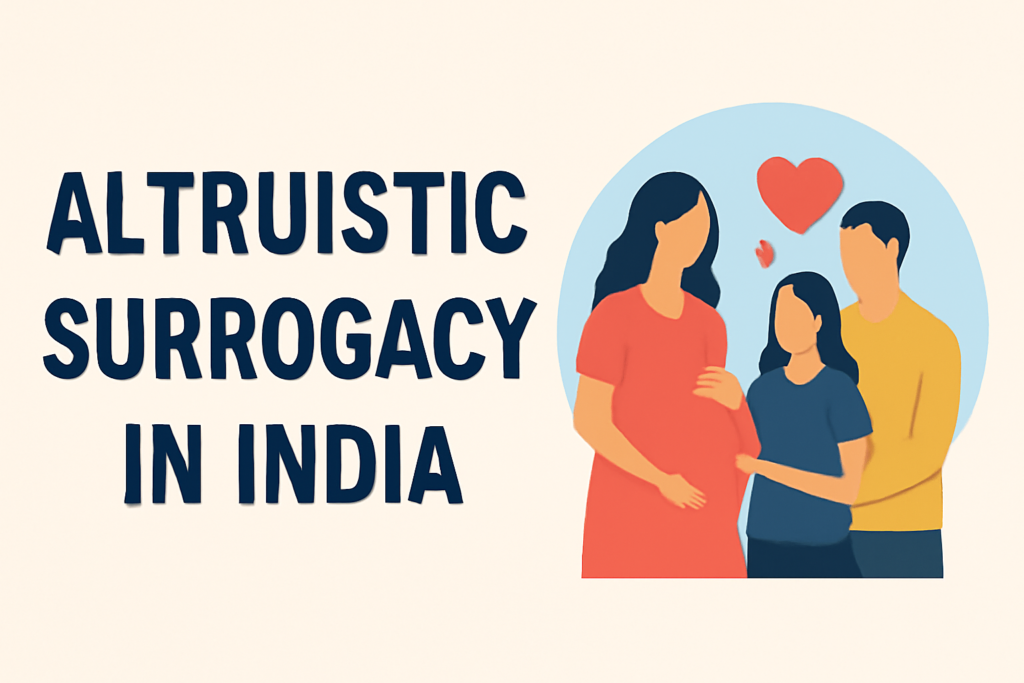Overview of Altruistic Surrogacy in India Types of Surrogacy That Might Be Legal and Stable in India
Altruistic surrogacy in India is a practice of assisted reproductive technology in which a woman gestates a child for another individual or couple without the explicit intent to be compensated financially (beyond the reimbursement of justifiable medical expenses). Unlike commercial surrogacy, which typically involves a fee to the surrogate, altruistic surrogacy is intended to be “more ethical and altruistic.”

This has a lot of discussion in the past few years, particularly after the passage of the Surrogacy (Regulation) Act 2021, which seeks to regulate surrogacy and provide an enabling framework for its practice in India.
What is Altruistic Surrogacy?
Altruistic- meaning “selfless; unselfish”, is where the surrogate is not paid to carry a child for another person, but is still compensated for any expenses she incurred during her pregnancy. Instead, she is paid for actual medical costs, like prenatal care, hospital bills and other pregnancy-related expenditures. The goal is to also aid a person or couple who are unable to give birth to a child.
Altruistic vs Commercial Surrogacy
The fundamental distinction between altruistic and commercial surrogacy is financial in nature. The former category is commercial surrogacy, in which the surrogate mother is paid a generous sum of money for giving birth to the child; while the latter is called altruistic surrogacy: the surrogate mother is not reimbursed in any form for her time and energy, other than direct necessary medical expenses. It is seen as the more ethically-defensible form of surrogacy because it removes the risks of exploitation and emphasizes the act of giving.
The Legal Terrain of Surrogacy in India
India has a long and chequered history with surrogacy, with both commercial and altruistic surrogacy a matter of public debate. Surrogacy laws and regulations in India have undergone dramatic changes over the decades.
The Surrogacy (Regulation) Act, 2021 came into force to regulate surrogacy, clear the misconceptions and provide foolproof mechanism in the entire process. The Legal Reform The Act has brought about some key changes including the banning of commercial surrogacy, limiting surrogacy to only altruistic surrogacy. The legislation is designed to protect the rights of both the surrogate and the would-be parents, to prevent any potential exploitation for financial gain.
Eligibility for Altruistic Surrogacy
There are also significant restrictions in the new legislation, which will allow only Indian heterosexual couples married for at least five years to obtain a child through surrogacy, if they cannot conceive for medical reasons. The surrogate must be a close relative of the intended parents as well, and she must have already been married and had children of her own. She has to be also in the range of 25 to 35 years, with a healthy test before undergoing the surgery.
The Strain of Altruistic Surrogacy
Practice of altruistic surrogacy Altruistic surrogacy is a complex process taking place within a few steps from the first consultations to medical interventions, and is subject to strict medical and legal supervisions.
Medical and Legal Procedures
First, the intended parents need ‘go over’ with a fertility doctor about how surrogacy works. Then the surrogate will be submitted to several different tests, including genetic testing, to make sure the woman is healthy enough to be a surrogate. Following mutual acceptance of the deal terms, legal documents are prepared which document the roles, responsibilities and expectations of the respective parties.
Selection of the Surrogate subjected to Screening
Candidates for surrogacy must meet rigorous medical and psychological standards. They need to be physically sound and have no medical problems that could interfere with a pregnancy. Surrogates also undergo psychological screening to ensure they are psychologically ready for surrogacy.
Role of Fertility Clinics
Fertility clinics are such an important factor in surrogacy. They facilitate any medical treatments, if any are required, such as in-vitro fertilization (IVF), and they also oversee the surrogate’s wellness all through the entire pregnancy. The clinics also facilitate that the surrogacy contract is in compliance with the law and the moral codes.
Ethical Considerations
Ethical aspects surrounding altruistic surrogacy are the topic of many discussions. On the other hand, it allows people who cannot bear to have whyte babies to be parents. Detractors, meanwhile, say surrogacy risks exploiting women, even when no money changes hands.
Exploitation vs. Empowerment
Albeit altruistic surrogacy may be regarded as a choice for women to express empowerment in helping others, but the underlying fear of coercion remains, mainly when the surrogate is a family member. And the question are, is altrustic surrogacy really voluntary when the surrogate is still influenced psychologically or socially?
Psychological Impact to Surrogates
Even if altruistic, surrogacy may have important psychological consequences for the surrogate mother. Many surrogates, after giving birth, face an emotional struggle with giving the baby up. Appropriate counselling and psychological support are essential for the welfare of the surrogate.
Hurdles in Good Samaritan Surrogacy
Altruistic surrogacy is, however, not free from issues.
Stigma and Cultural Issues
Surrogacy is a taboo in many circles of Indian society. Cultural norms and old-fashioned ideas about motherhood can make it difficult for surrogate mothers to gain acceptance in their societies. This stigma can also result in isolation and suffering for the surrogate.
Economic Factors in Altruistic Surrogacy
Intended parents encounter one of the surrogacy cons – surrogacy prices. Altruistic surrogacy should be compensation free, but there are likely medical and legal fees associated. There are also psychological and emotional costs that are not perhaps as easily quantifiable but can take their toll on both the surrogate and the intended parents.
By the Published on February 8, 2023 The Future of Altruistic Surrogacy in India
The future of altruistic surrogacy in India, outside of this new regulation, is unclear. With so many new laws emerging, along with the changing public perception of surrogacy, there is a chance that the surrogacy processes themselves will be further experienced and controlled.
Global Comparison
India, considered to have one of the most altruistic surrogacy laws – when compared to the United States, the UK or Canada – has relatively conservative laws on the subject. Many countries have acted to control commercial surrogacy, but aspiring parents have also been given broader latitude when it comes to international surrogacy arrangements — a freedom curbed in India.
Conclusion
Altruistic surrogacy is a developing concept in India, fraught with ethical and legal complexities. Though it seems like a promising solution for couples who long for a child but can’t conceive, it also leaves a number of open-ended questions about the rights and welfare of these women who will carry the pregnancy. The way forward for altruistic surrogacy in India in a grey area of law is unclear and will hinge on ethical, legal and social issues as the law evolves.
FAQs
What is altruistic surrogacy in India?
Altruistic surrogacy in India is when a surrogate mother carries a child with no compensation, expect for medical expenses, for someone else. Assistance is about helping others without damaging them.
What is the difference between altruistic surrogacy and commercial surrogacy?
The distinction is altruistic surrogacy doesn’t pay the surrogate mother more than the required expense for medical procedure, and commercial surrogacy provides compensation for acting as a surrogate mother.
What are the legal obligations for a surrogacy in the welfare state of India?
Under the Surrogacy (Regulation) Act, 2021, altruistic surrogacy is only allowed for married Indian couples suffering from medical infertility. The surrogate needs to be a relative of the recipients and fulfill health and age criteria.
Are there payments to surrogates in altruistic surrogacy?
Surrogates are not paid beyond medical expenses and other related pregnancy costs, no.
What is the effect of altruistic surrogacy on psychology?
The surrogate mother is sometimes faced with emotional difficulties, following the baby’s birth, such as bonding with the baby and separation. Emotional support is critical in helping them work through.


